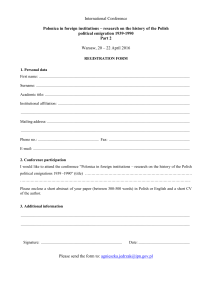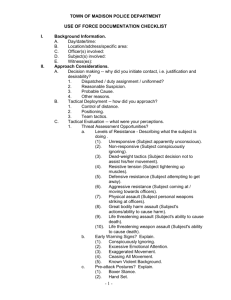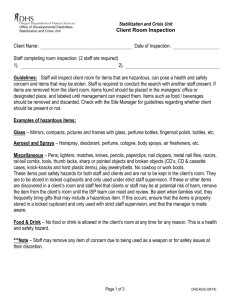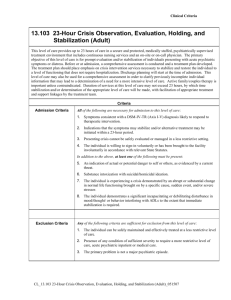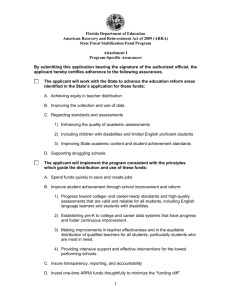Streszczenie w języku angielskim rozprawy doktorskiej ppłk. mgr
advertisement
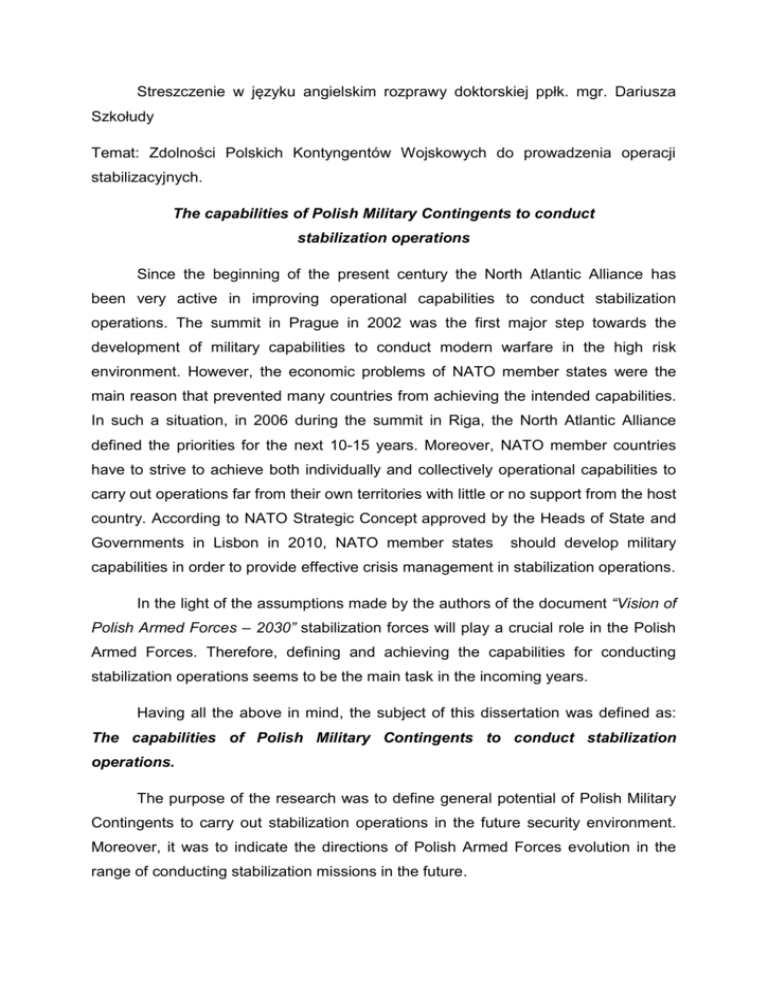
Streszczenie w języku angielskim rozprawy doktorskiej ppłk. mgr. Dariusza Szkołudy Temat: Zdolności Polskich Kontyngentów Wojskowych do prowadzenia operacji stabilizacyjnych. The capabilities of Polish Military Contingents to conduct stabilization operations Since the beginning of the present century the North Atlantic Alliance has been very active in improving operational capabilities to conduct stabilization operations. The summit in Prague in 2002 was the first major step towards the development of military capabilities to conduct modern warfare in the high risk environment. However, the economic problems of NATO member states were the main reason that prevented many countries from achieving the intended capabilities. In such a situation, in 2006 during the summit in Riga, the North Atlantic Alliance defined the priorities for the next 10-15 years. Moreover, NATO member countries have to strive to achieve both individually and collectively operational capabilities to carry out operations far from their own territories with little or no support from the host country. According to NATO Strategic Concept approved by the Heads of State and Governments in Lisbon in 2010, NATO member states should develop military capabilities in order to provide effective crisis management in stabilization operations. In the light of the assumptions made by the authors of the document “Vision of Polish Armed Forces – 2030” stabilization forces will play a crucial role in the Polish Armed Forces. Therefore, defining and achieving the capabilities for conducting stabilization operations seems to be the main task in the incoming years. Having all the above in mind, the subject of this dissertation was defined as: The capabilities of Polish Military Contingents to conduct stabilization operations. The purpose of the research was to define general potential of Polish Military Contingents to carry out stabilization operations in the future security environment. Moreover, it was to indicate the directions of Polish Armed Forces evolution in the range of conducting stabilization missions in the future. The subject of this research was to assess the capabilities of operational components in stabilization operations and crisis response missions. The main objective of the research was to determine the capabilities necessary for Polish Military Contingents to conduct stabilization operations in the light of current and future challenges and threats. The research was conducted in three phases: The initial stage – after choosing the topic of the dissertation in order to specify the objective of the research the literature was collected and analyzed. At this step, the initial hypothesis was put forward, research methods, as well as the purpose and subject of the research were defined and the area of the research was identified. The main stage included arranging and conducting the research in order to verify the working hypothesis with the help of appropriate research methods and techniques. The final stage included gathering the factual material and describing the research results, as well as presenting them in the form of the dissertation. In order to solve the main problem the survey was carried out among 133 officers attending various courses at the National Defence University. Besides, the author of this dissertation interviewed recognized expert researchers from National Defence University. This dissertation consists of an introduction, five chapters, final conclusions supplemented with appendixes. The first methodological chapter describes the conduct and area of research and its constrains. In addition, this chapter presents the reason of the research, as well as the subject and the objective of the research, the hypothesis and research methods, techniques and tools. The second chapter discusses the theoretical and practical results of the undertaken studies with respect to the nature of stabilization operations. The most important issues presented are the results of the survey concerning characteristic features of stabilization operations. The third chapter presents the results of the research with reference to requirements expected from the armed forces in the future. The data for the analysis came from the experience of Polish Military Contingents gained during stabilization activities in Bosnia and Herzegovina, Kosovo, Iraq and Afghanistan. The fourth chapter in contrast to the third one deals with the requirements imposed on Polish Military Contingents with respect to the future challenges and threats. The results of the empirical research enabled partial verification of the working hypothesis. The fifth chapter is an essential part of the research undertaken by the author of this dissertation. The empirical and theoretical studies allowed to define future tasks for Polish Military Contingents. In addition, this chapter shows the model of armed forces training with respect to stabilization missions in the future. The research resulted in solving the main problem which may be defined as the following hypothesis: Stabilization operations conducted by armed forces will still play a crucial role in the international security building. Therefore, multinational operations will be probably conducted in the future security environment as an essential part of the crisis response. Stabilization forces will be supposed to operate primarily in the urban environment where the differences between military and non - military threats will be difficult to define. Moreover, the significant number of threats will be caused by small groups of rebels in a long time. However, non – military threats will concern the societies with limited opportunities of economic development and it will be used by rebels for their own purposes. Stabilization forces should be also prepared to provide humanitarian help and to carry out direct operations. To sum up, Polish Military Contingents should develop the capabilities to command, reconnoitre, isolate and search the areas of operation, to maintain control over significant routes, to protect own troops and to counter Improvised Explosive Devises, precision fire, air support, special actions.



